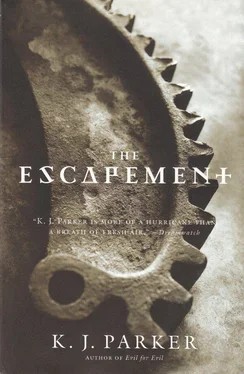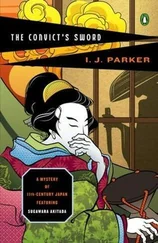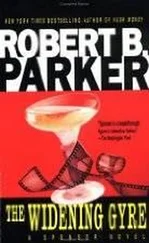K Parker - The Escapement
Здесь есть возможность читать онлайн «K Parker - The Escapement» весь текст электронной книги совершенно бесплатно (целиком полную версию без сокращений). В некоторых случаях можно слушать аудио, скачать через торрент в формате fb2 и присутствует краткое содержание. Жанр: Фэнтези, на английском языке. Описание произведения, (предисловие) а так же отзывы посетителей доступны на портале библиотеки ЛибКат.
- Название:The Escapement
- Автор:
- Жанр:
- Год:неизвестен
- ISBN:нет данных
- Рейтинг книги:4 / 5. Голосов: 1
-
Избранное:Добавить в избранное
- Отзывы:
-
Ваша оценка:
- 80
- 1
- 2
- 3
- 4
- 5
The Escapement: краткое содержание, описание и аннотация
Предлагаем к чтению аннотацию, описание, краткое содержание или предисловие (зависит от того, что написал сам автор книги «The Escapement»). Если вы не нашли необходимую информацию о книге — напишите в комментариях, мы постараемся отыскать её.
The Escapement — читать онлайн бесплатно полную книгу (весь текст) целиком
Ниже представлен текст книги, разбитый по страницам. Система сохранения места последней прочитанной страницы, позволяет с удобством читать онлайн бесплатно книгу «The Escapement», без необходимости каждый раз заново искать на чём Вы остановились. Поставьте закладку, и сможете в любой момент перейти на страницу, на которой закончили чтение.
Интервал:
Закладка:
Ziani looked back at him, like someone looking into a mirror. "The meeting is closed," he said.
18
There was a man called Cuno Abazes; a Mezentine, about thirty-two years old, a bachelor in a city where nearly everybody over the age of twenty was married. He didn't belong to a Guild, having failed the trade test for the Carpenters'. Instead, he'd earned a sparse living as a porter, drover and general labourer, loading and unloading, holding horses and collecting nightsoil for the Fullers." The war had been remarkably kind to him: he'd joined the army on the first day of recruitment, realising it was his one and only chance of making good, and had done so well that within a matter of weeks he'd been made an officer, a captain of general infantry. He'd been assigned to guard duty on the embankment on the day of the assault, but a splinter of rock from an allied round shot had hit him on the side of the head as he went to report for the start of his shift, and when the embankment was blown up he was lying in bed in the hospital. His injuries proved to be superficial, and next morning he was passed fit for active service and told to report to the Guildhall for sentry duty. There he heard the news that the war was over.
"That's terrible," he blurted out. "What's going to happen to the army?"
"Being disbanded," they told him. "Express term of the peace treaty. You'll be able to go back to your old life, pick up where you left off. Isn't that good news?"
Cuno Abazes didn't reply to that. Instead, he asked, "So who won?" and they said, "You know, that's a very good question." Later that day, Captain Abazes was on duty in the main hall when Chairman Psellus himself passed through, on his way to the small conference suite. Since hearing the bad news about the end of the war, Abazes had had time to calm down and think it over, and he'd reached the conclusion that even if they were doing away with the army as such, they were still going to need guards, sentries, security officers, and this was exactly the time when they'd be choosing who to keep and who to let go. Accordingly, as Psellus went by, he snapped to attention like the swinging arm of an onager slamming against the stop. Abazes had always been good at drill, and he put everything he'd got into it, with the result that the crack of his heels coming together made Psellus shy like a horse and stare at him for a moment. That disconcerted him; he'd assumed the commander-in-chief of the armed forces of the Republic would be a connoisseur of fine drill, but Psellus had reacted as if he'd stuck his tongue out at him and blown a raspberry.
"Very good, Captain," said the other man (shorter than the chairman, somewhere between thirty and forty-five, oddly dressed but otherwise completely unmemorable). "Carry on."
Instinctively, Abazes saluted, but neither the unmemorable man nor the chairman were watching. They were walking away from him, chatting in low, comfortable voices; old friends, he could tell. Well, he thought, obviously the other man had to be something to do with the military; at least, he sounded right, and he'd known what to say. Cuno Abazes muttered a silent prayer, and went back to doing his imitation of a statue, or one of those lifesize mechanical people that used to be in fashion, many years ago.
"You've got them saluting already," Ziani said. "I'm impressed."
Psellus shrugged. "Did he do it right? I don't know about these things."
"He wouldn't have gone down well with a Vadani drill sergeant," Ziani replied. "Slouching, gut sticking out, hand wobbling around like he was trying to swat flies. You'd never have made soldiers out of them, not if the war had dragged on for twenty years. It's not in our nature."
"I'm delighted to hear you say so," Psellus said. "War is neither a craft nor a trade, and I'm pleased we have an excuse not to meddle with it any more. By all means let's leave it to your precious Vadani. Let them get from it what pleasure they can."
Ziani laughed. "You still don't understand them," he said. "Not that there's any reason why you should. There's rather more to them than you think, but compared to us they're still just savages."
They walked on together in silence as far as the foot of the grand staircase; and Psellus thought: I've come here every day for as long as I can remember, but I've never seen it before, there's always been too many people in the way-my colleagues, my fellow clerks, hurtling up and down the stairs with files and ledgers. It's almost as though they were there to distract attention from the building itself; because we didn't build it, did we? The people who came before us did that, the people who made the padlock. And then he thought: I saved the Republic, but I don't want it any more; even looking at it makes me feel sick. And then he said: "You're really a patriot, aren't you, Ziani?"
Ziani nodded. "Always have been," he said.
"A true believer?"
"Always."
Psellus accepted the statement with a slight movement of head and shoulders. "You never intended to destroy us," he said.
"Of course not." Ziani wasn't looking at him. He was gazing at the staircase, the vaulted ceiling, the carved balustrades, the allegorical frescoes on the walls (Perfection illuminating the assembled crafts and trades; Perfection being a tall, big-bosomed woman in flowing red robes, and each craft and trade represented by a grey-haired man carrying the archetypal tool or instrument of his calling; but why, he couldn't help wondering, had they all been painted with white skins, like they were savages?). "Only a lunatic would burn down his own house; he'd have nothing to come home to."
"And that's really all it was," Psellus said, hesitating, as though he couldn't set foot on the first tread of the stair until he'd had an answer. "You just wanted to come home."
"Of course." Ziani traced the edge of a carved border with the tip of his finger; it was smooth, the sharp edge worn down by a million clerks brushing against it as they made way for each other on the stairs. "If I'd wanted to be rich and powerful, I'd have gone far away, the Old Country or somewhere like that; I'd have settled down and started a factory. Probably I'd have founded a new Mezentia, just like this one only better. That's what big men do, heroic types, idealists, rebels." He shook his head. "I just did what I had to, to put things right. No choice, really."
Psellus climbed the first step. "The death toll…"
"I can't help that," Ziani said briskly. "I can't be held responsible. Nor can you." He turned his face, and Psellus couldn't meet his eyes. "I don't know all the ins and outs of administrative procedure, but if you were chief clerk of Compliance, it was you who gave the order that started the war. Yes?"
"Yes."
"Not me," Ziani said. "Sure, I planned the whole thing. I worked out every step, while I was dying of thirst out on the plain, before Duke Orsea's people found me. By the time they picked me up, I'd planned as far as turning the scorpions on the Aram Chantat-I didn't know they were called that, of course, I just knew there were millions of savages out there beyond the desert, and they were the only force on earth that could bring down the Republic; so of course they were part of the plan from the beginning; like a mainspring, if you like. Orsea and Valens were the gear train-I was lucky there, I admit it. I knew that if I could persuade the Eremian duke to let me build a factory, the Republic would have to declare war. I wanted to bring in the Vadani, to keep the war going, and I knew I'd have to find some mechanism to get the Vadani to bring in the savages beyond the desert. That was quite easy, once I found out the Vadani duke was unmarried, and the stupid courtly-love triangle with Orsea, Valens and the duchess gave me that whole assembly practically complete, I just had to make a few connections. The chain of oases across the desert was a stroke of luck, but I was pretty well sure there had to be something like that once I heard about the raiding parties. If I hadn't had those strokes of luck, I'd have had to manufacture something myself to do the job; it'd have taken longer and needed a lot more effort, but I'd have got there in the end. The real luck was finding Daurenja."
Читать дальшеИнтервал:
Закладка:
Похожие книги на «The Escapement»
Представляем Вашему вниманию похожие книги на «The Escapement» списком для выбора. Мы отобрали схожую по названию и смыслу литературу в надежде предоставить читателям больше вариантов отыскать новые, интересные, ещё непрочитанные произведения.
Обсуждение, отзывы о книге «The Escapement» и просто собственные мнения читателей. Оставьте ваши комментарии, напишите, что Вы думаете о произведении, его смысле или главных героях. Укажите что конкретно понравилось, а что нет, и почему Вы так считаете.












